June 12, 2023: IHS Updates for Tribes and Tribal and Urban Indian Organizations
This bi-weekly update provides up to date information on Indian Health Service and other federally-hosted meetings, conferences, deadlines and recognition from across the Indian health system. For more information or questions, email IHSPublicAffairsStaff@ihs.gov.
Pride Month 2023
June is Pride Month, where the IHS joins many to celebrate the world’s lesbian, gay, bisexual, transgender, questioning and two-spirit community’s freedom to be themselves. Recognizing that LGBTQ-2S American Indian and Alaska Native individuals face disparities in care, discrimination and obstacles to treatment—the goal of the IHS is to celebrate and recognize the LGBTQ-2S community and work to ensure that comprehensive, culturally acceptable health care services are available and accessible to all of Indian Country. IHS carries out this work by providing enhanced resources for health issues, developing better information regarding health needs, and working to close the current health disparities gap for Native LGBTQ-2S individuals.

IHS and Alaska Tribal Health Compact Successfully Complete Fiscal Year 2024 Negotiations
The IHS Alaska Area Indian Self-Determination and Education Assistance Act Title V negotiations team recently completed FY 24 negotiations with tribal representatives from the Alaska Tribal Health Compact in Anchorage, Alaska. The week-long negotiations represent the largest single compact negotiated with the IHS to date. Co-signers of the Alaska Tribal Health System continually demonstrate excellence and innovation. The IHS is committed to sustaining relationships with tribal partners to enhance health equity for all Alaska Natives and American Indians. To learn more, read our press release.
IHS Awards $2M to City of Gallup to Prevent Alcohol-Related Deaths in McKinley County, New Mexico
The IHS Division of Behavioral Health has awarded $2 million through a cooperative agreement to the city of Gallup, New Mexico, to prevent alcohol-related deaths among their American Indian and Alaska Native population by providing withdrawal management and shelter services at the Na’Nizhoozhi Center, Inc. The facility is a leading detox and inpatient drug and alcohol rehab center in Gallup. The Preventing Alcohol-Related Deaths program will enhance the IHS partnership with the city of Gallup, the Gallup Indian Medical Center, and local tribes. These withdrawal management services are critical to the American Indian and Alaska Native population in the region. The IHS will continue working with local entities to build clinical and behavioral health capacity to prevent alcohol-related deaths. To learn more about this funding, read the IHS press release.
IHS Awards $1.2 Million in Tribal Management Grants to Support Tribal Self-Determination
The IHS has awarded more than $1.2 million in tribal management grants to twelve tribes as part of a competitive program to develop and improve tribal capacity to manage health programs under the authority of the Indian Self-Determination and Education Assistance Act. The Tribal Management Grant Program is designed to prepare tribes and tribal organizations for assuming all or part of existing IHS programs, functions, services and activities, and to further develop and improve their health management capabilities. Tribal leaders and members are in the best position to understand the health care needs and priorities of their communities, and the tribal management grants are a critical component in assisting tribal partners with building health care management capacity and ensuring the tools are in place for a successful transition of programs and services. To learn more about the grant recipients, read the IHS press release.
U.S. Department of Health and Human Services Annual Regional Tribal Consultations
The IHS has begun participating in HHS Regional Tribal Consultation sessions with tribal leaders from across Indian Country. IHS Deputy Director Ben Smith joined HHS colleagues, including HHS Regional II Director Dr. Dara Kass, for the HHS Region II Tribal Consultation, hosted by the Seneca Nation at their Community Health and Wellness Center in Irving, New York, to consult with the eight federally recognized tribes in this region. HHS has 10 regional offices directly serving state, tribal and local organizations. The sessions are designed to provide tribal leaders with the opportunity to guide the department on improving tribal outreach and coordination and discuss programmatic and policy issues. The IHS provides updates on work we’re doing across the Indian health system and outlines how to provide high-quality health and resource needs in tribal communities and improve the health and well-being of our patients, communities and people.
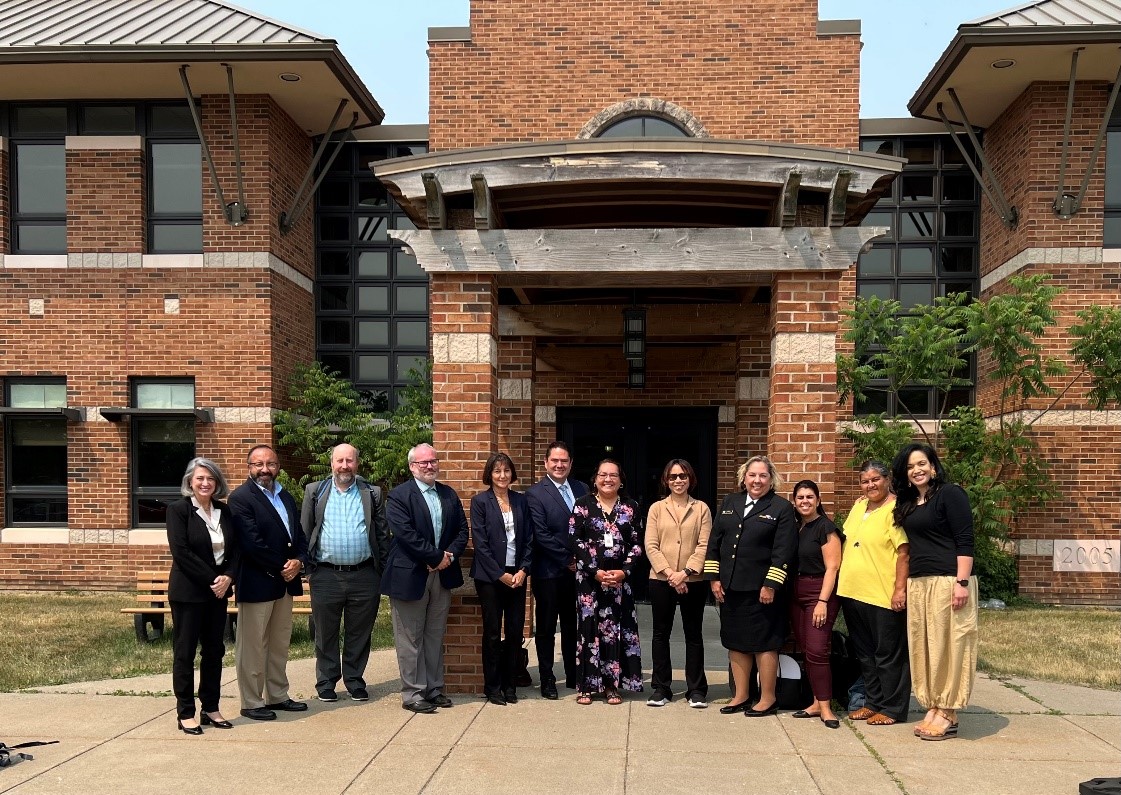
HHS Regional Tribal Consultation participants
The CMS Health Equity Conference
The Centers for Medicare and Medicaid Services recently hosted its first-ever Health Equity Conference at Howard University in Washington, D.C. The conference focused on convening leaders in health equity from various federal agencies, health provider organizations, academia, community-based organizations and more. IHS Deputy Director Ben Smith joined the conference to discuss health equity in American Indian and Alaska Native communities. Thank you to CMS for highlighting the IHS and tribal communities as part of this important conversation.
Community Health Improvement Week: Honoring IHS Community Health Representatives
This week marked the national observance of Community Health Improvement Week, intended to honor health professionals who work closely with communities and dedicate their lives to improving the health of others. I want to acknowledge the unparalleled presence of community health representatives throughout the Indian health system. CHRs embody the values, culture and experiences of the tribal communities where they work and are instrumental in serving as a link between the clinical setting and the community to improve access to quality services. CHRs have become essential to tribal community-oriented primary health care services. To learn more, read the recent IHS blog.
June Nurse of the Month
Congratulations to Christian Clarquist, RN, director of nursing at the Lac Courte Oreilles Community Health Center in the Bemidji Area, for being selected as the IHS Division of Nursing Services’ Nurse of the Month for June. As director of nursing, Clarquist inspires the next generation of nurses as she trains students with patience and energy while ensuring the health center executes the most up-to-date policies in accordance with requirements and national standards. Read more about Clarquist and previous Nurse of the Month recipients on the DNS webpage.
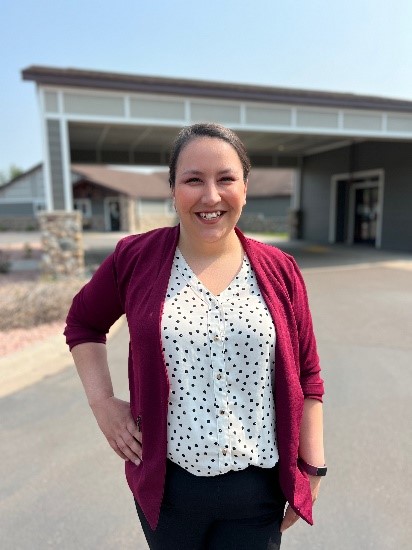
Christian Clarquist, RN, IHS Division of Nursing Services’ Nurse of the Month for June
Men’s Health Month
Throughout June, Men’s Health Month encourages boys and men to take charge of their overall health by implementing healthy living decisions. American Indian and Alaska Native men face greater health disparities, so regular doctor visits and screening tests are essential in reducing the risks of common health issues. Early detection and prevention can save lives—during Men’s Health Month and beyond, it is important to encourage men to prioritize their health. Join the IHS this week in celebrating Men’s Health Week and Wear Blue Day on June 16 to raise awareness of preventable health issues and encourage early detection and treatment of diseases.
National Institutes of Health’s All of Us Research Program
The National Institutes of Health’s All of Us Research Program is hosting four virtual All of Us tribal informational presentations and discussions. This landmark health research program aims to find more precise ways to improve health for all populations through individualized prevention, treatment and care.
Every Tuesday in June, the tribal engagement team at All of Us will host sessions for tribal leaders, Indigenous-led organizations, Indigenous researchers and community members across tribal land and urban Indian communities. For more information, visit the webpage.
- Session 2: How Researchers Access and Use All of Us Data
June 13 from 1:00 - 3:00 p.m. ET | Register now - Session 3: Describing Self-Identified AI/AN Participants in All of Us Data
June 20 from 1:00 - 3:00 p.m. ET | Register now - Session 4: Data and Partnerships in All of Us
June 27 from 1:00 - 3:00 p.m. ET | Register now
Tribal Lifeline Services
Administered by the Universal Service Administrative Company, Lifeline is a Federal Communications Commission program to help make communications services more affordable for eligible consumers. The Lifeline program currently offers consumers on tribal lands up to $34.25 off of monthly phone or Internet services. Find the online application by visiting CheckLifeline.org, or learn more at LifelineSupport.org.
Indian Health Geriatric Scholars Pilot Applications for 2023 Cohort Opens June 5
The Indian Health GeriScholars Program, funded by the IHS Alzheimer’s Grant Program, invites applications to the 2023 Indian Health GeriScholars year two pilot starting June 5. The 2023-2024 cohort is limited to 15 physicians, nurse practitioners, PAs, or pharmacists sponsored by their IHS, tribal, or urban Indian health program. The Indian Health GeriScholars pilot will provide participating clinicians with an individual intensive learning track for professional continuing education, including:
- An intensive training in geriatrics from one of three Geriatrics Board Review courses.
- A mentored geriatric improvement project at their local facility.
- A clinical practicum or mentorship in geriatric practice.
- Ongoing education, training, and peer support as an Indian Health GeriScholar.
The application period closes on July 5, 2023. For more information or to request an application, please email valerie.jones@ihs.gov or visit the Alzheimer’s Training and Education webpage next week.
Telebehavioral Health Center of Excellence Training
The IHS Telebehavioral Health Center of Excellence Tele-Education Program is hosting the following training for health care providers this week:
- TBHCE Webinar Series: Overview of Binge Eating Disorder
June 13 at 12:00 p.m. ET | Register now
Advancements in Diabetes Webinar
The IHS Division of Diabetes Treatment and Prevention: Advancements in Diabetes Webinar Series is hosting the following webinar for health care providers this week:
- Post-Acute Sequelae of COVID (Long COVID)
June 15 at 3:00 p.m. ET. | Attend the webinar
Save the Date
- June 13: Tribal Leaders Diabetes Committee Meeting
- June 15: DSTAC Monthly Meeting
- June 20-21: IHS National Tribal Advisory Committee on Behavioral Health Meeting
- June 22: The Community Health Aide Program Tribal Advisory Group Meeting
- June 26-29: 2023 Tribal Self-Governance Annual Conference
Latest IHS Blogs
Other News
2023 USPHS Annual Symposium and Training
The USPHS Pharmacy Professional Advisory Group recognized two IHS pharmacists during the 2023 USPHS Annual Symposium and Training in Tulsa, Oklahoma. Capt. Rebecca Reyes, IHS Phoenix Area, was awarded the Mary Louise Andersen Leadership Award, and Lt. Cmdr. Kristin Allmaras, IHS Bemidji Area, received the Junior Pharmacist of the Year Award. Several IHS officers were also recognized by the American Indian and Alaska Native Commissioned Officers Association during the event.
- 2023 Rear Adm. George Blue Spruce Jr. Flag Officer Award - Rear Adm. Travis Watts
- 2023 Dr. Taylor McKenzie Senior Officer Award - Cmdr. Dodson Frank
- 2023 Annie Dodge Wauneka Award - Cmdr. Karen Beauvais
- 2023 Elizabeth Peratrovich Leadership Award - Lt. Cmdr. Nicholas Cushman
- 2023 Junior Officer Award - Lt. Cmdr. Kristen Young
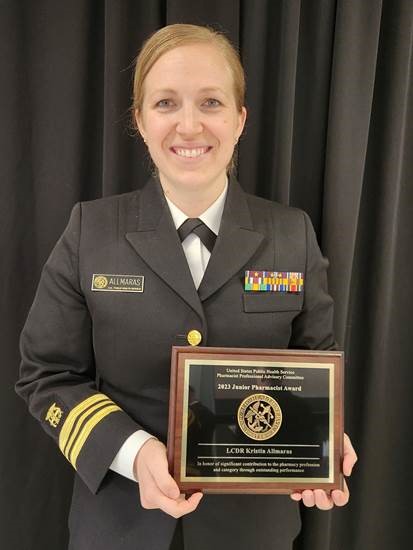
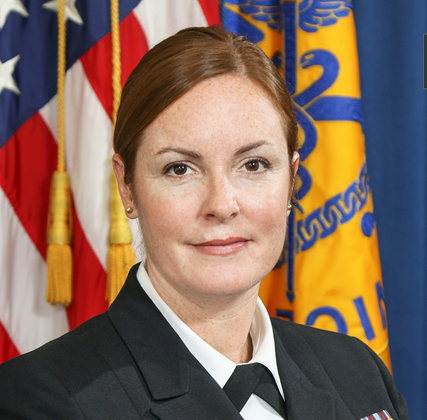
(Photo 1) Lt. Cmdr. Kristin Allmaras, PharmD, Red Lake Service Unit (Photo 2) Capt. Rebecca Reyes, PharmD, Phoenix Area Office
The Makah Tribe and Lummi Nation of Western Washington recently hosted U.S. Environmental Protection Agency deputy directors for wastewater management, groundwater and drinking water to tour the tribal water and wastewater facilities. Also in attendance during the visit were Region 10 EPA personnel and IHS Portland Area staff. The IHS frequently partners with the EPA and tribal nations for IHS Sanitation Facilities Construction projects to address water, wastewater and solid waste deficiencies in tribal communities. The IHS and EPA are contributing toward funding the $19 million Lummi Nation Gooseberry Point wastewater treatment plant renovation and expansion.
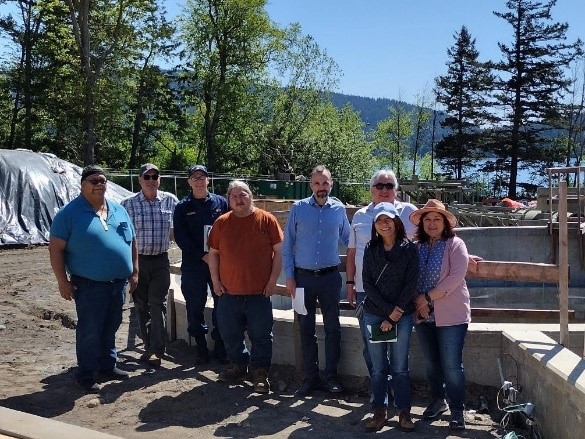
Makah, Lummi Nation of Western Washington, EPA and IHS leadership touring the Lummi Nation Gooseberry Point wastewater treatment plant
Phoenix Indian Medical Center staff recently met with Navajo Nation Attorney General Ethel Branch and Division of Social Services Executive Director Thomas Cody to discuss efforts to support the American Indian and Alaska Native community members impacted by behavioral health and substance abuse clinic closures in and around Phoenix, Arizona. Additionally, they held a multi-state meeting with IHS, tribal and urban Indian organizations on May 31. Each meeting focused on how PIMC and the Phoenix and Navajo Areas will continue to coordinate with the 2-1-1 Arizona, Arizona Health Care Cost Containment System, tribal leadership, urban Indian program leadership and community partners to provide needed treatment, coordination, placement and transportation for those impacted.
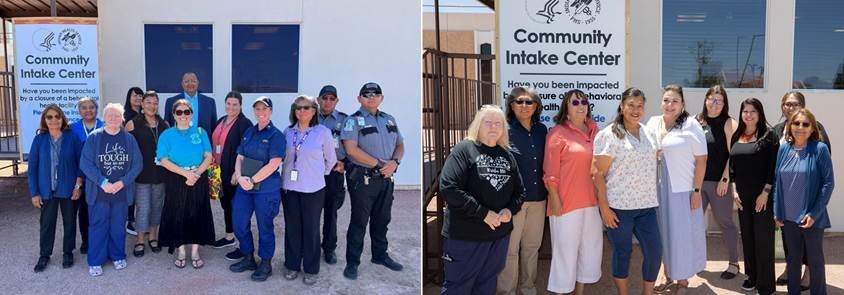
(Photo 1) PIMC staff with Navajo Nation Attorney General and Division of Social Services Executive Director. (Photo 2) PIMC staff with Stacey Ecoffey, IHS deputy director for intergovernmental affairs, and Dr. Rose Weahkee, director of the Office of Urban Indian Health Programs
National Pharmacy Council Monthly Spotlight - May 2023
This month, the National Pharmacy Council is highlighting Tanana Chiefs Conference Pharmacies, the Chief Andrew Isaac Health Center and the Upper Tanana Health Center in the Alaska Area. The TCC pharmacy services provide pharmaceutical care to approximately 16,000 American Indians and Alaska Natives throughout a remote swath of Interior Alaska from two pharmacies—Chief Andrew Isaac in Fairbanks and Upper Tanana Health Center in Tok, Alaska. The pharmacy team at TCC is dedicated to providing high-quality, innovative and culturally sensitive care to the patients of the TCC region. Approximately one-half of the pharmacists and a quarter of the pharmacy technician staff at TCC are American Indian or Alaska Native. The cultural makeup of the pharmacy staff reinforces the TCC’s guiding principle of Ch’eghwtsen’, or “True Love,” for colleagues and those they serve.
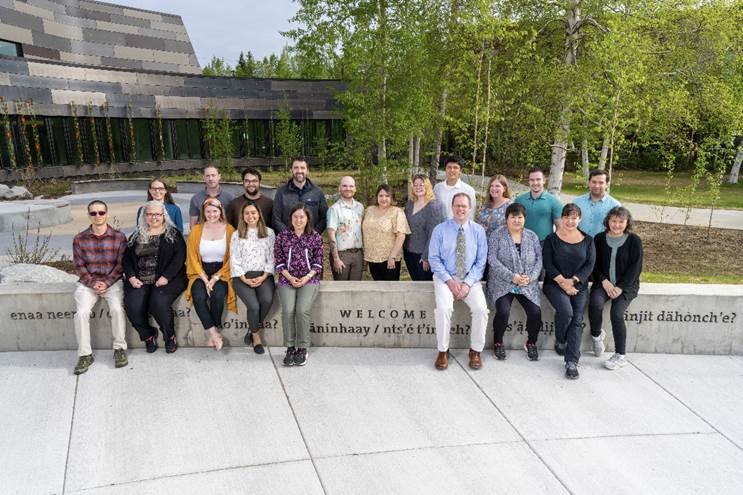
Tanana Chiefs Conference Pharmacies, May National Pharmacy Council Spotlight


